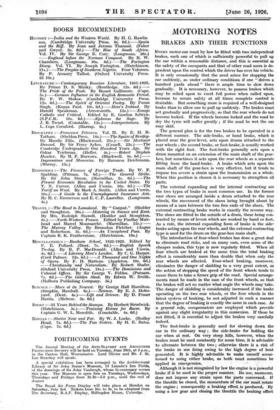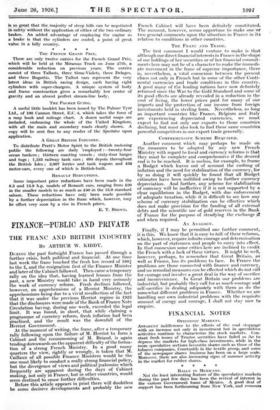MOTORING NOTES
BRAKES AND THEIR FUNCTIONS
EVERY motor-car must by law be fitted with two-independent brakes, each one of which is sufficiently powerful to pull up the car within a reasonable distance, and this is essential as the safety of the occupants and that of other road users is de- pendent upon the control which the driver has over his vehicle. It is only occasionally that the need arises for stopping the car suddenly, as under ordinary conditions if one "drives a hundred yards ahead " there is ample time to slow down gradually. It is necessary, however, to possess brakes which may be relied upon to exert full power when called upon, because to secure safety at all times complete control is desirable. But something more is required of .a well-designed brake than to allow one to pull up suddenly. The brakes must act gradually and progressively, so that the rear wheels do not become locked. If the wheels become locked and the road be dry the tyres will suffer greatly ; if the road be wet the car may skid.
The general plan is for the two brakes to be operated in a different manner. The side-brake, or hand brake, which is placed near the gear-lever, acts upon drums attached to the rear wheels ; the second brake, or foot-brake, is usually worked with the right foot. The foot-brake generally acts upon a drum mounted on an extension of the main shaft of the gear- box, but sometimes it acts upon the rear wheels as a separate fitting from the hand-brake. A brake which acts upon the main shaft of the gear-box is very effective, but it tends to impose too severe a strain upon the transmission as a whole. When this position is chosen it is necessary to strengthen all parts.
The external expanding and the internal contracting are the two types of brake in most common use. In the former case shoes are arranged inside a drum attached to the rear wheels, the movement of the shoes being brought about by means of a cam between the two free ends of the shoes. The external, contracting brake works in exactly the reverse way. The shoes are fitted to the outside of a drum, these being con- tracted by means of levers which are worked by hand or foot. As a rule, the internal expanding form of brake is the side- brake acting upon the rear-wheels, and the external contracting type is used for the drum on the gear-box main shaft.
The introduction of four-wheel brakes has done a great deal to eliminate road risks, and on many cars, even some of the cheaper makes, this type is now -regularly fitted. When all four wheels are braked at the same time the total braking effect is considerably more than double that when only the rear wheels are affected. Four-wheel braking, moreover, eliminates the danger of skidding to a very great extent, as - the- action of stopping the speed of the front wheels tends to cause them to take a -firmer grip of the road. Special arrange. meats -Must be "made in the case of the front wheels, so that the brakes will act no matter what angle the wheels may take. The danger of skidding is considerably increased if the brake operating on the two rear wheels, or the four wheels in the latest system of braking, be not adjusted in such a manner that the degree of braking is exactly the same in each case. As a general rule, compensators are employed which provide againgt any slight irregularity in this connexion. If these be not fitted, it is essential to adjust the brakes very carefully indeed.
• The foot-brake is generally used for slowing down the ear in the ordinary way ; the side-brake for holding the car when at rest. On very steep hills, however, when the brakes must be used constantly for some time, it is advisable to alternate between the two ; otherwise there is a risk of the brake in use firing owing to the high degree of heat generated. It is highly advisable to make oneself accus- tomed to using either -brake, as both mast sometimes be applied in emergencies. •
Although it is not recognized by law the engine is a powerful brake if it be used in theproper manner. Its use, moreover, does not impose any strain upon the parts concerned. If the throttle be closed, the momentum of the car must rotate the engine ; consequently a braking effect is produced. By using a low gear and closing the throttle the braking effect is so great that the majority of steep hills can be negotiated in safety without the application of either of the two ordinary brakes. An added advantage of employing the engine as a brake is that the cylinders are cooled, a point of great value in a hilly country.
* *
Tap FRENCH GRAND PRIX.
There are only twelve entries for the French Grand Prig, which will be held at the Miramas Track on June 27th, a considerable reduction on previous years. The entries consist of three Talbots, three Sima-Violets, three Delages, and three Bugattis. The Talbot cars represent the very latest ideas in British racing design, each having eight cylinders with super-chargers, A. unique system of body and frame construction gives a remarkably low centre of gravity and an almost perfect stream-line body.
THE PALMER GUIDE.
A useful little booklet has been issued by The Palmer Tyre Ltd., of 100 Cannon Street, B.C. 4, which takes the form of a map book and mileage chart. A dozen useful maps are included, embracing the whole of the United Kingdom, with all the main and secondary roads clearly shown. A copy will be sent free to any reader of the Spectator upon application.
A GREAT BRITISH INDUSTRY.
To distribute Pratt's Motor Spirit to the British motoring public the following are daily employed :—twenty-four ocean tankers ; thirteen coasting vessels ; sixty-four barges and tugs ; 1,533 railway tank cars ; 694 depots throughout the British Isles ; 2,007 lorries and tank wagons and 450 motor-cars, every one of which is British-built.
RENAULT REDUCTIONS.
Some important price reductions have been made in the 8.3 and 13.9 h.p. models of Renault cars, ranging front £20 in the smaller models to as much as £40 in the 13.9 standard saloon. These reductions have only been made possible by a further depreciation in the franc which, however, may be offset very soon by a rise in French prices.
E. T. BROWN.











































 Previous page
Previous page